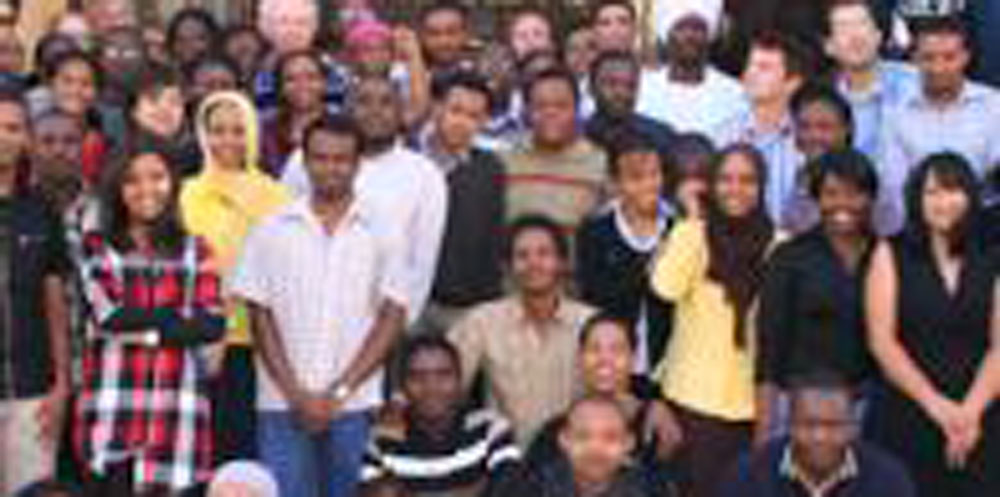
About the Project
This project is one of the 2010 WISE Awards winners.
Founded in 2003 with its first center in Cape Town, South Africa, AIMS recruits Africa’s most talented university graduates and provides them with the cutting-edge training in mathematics they need to enter technical professions or pursue graduate studies in technical fields.
AIMS offers full financial support, since the vast majority of AIMS students come from disadvantaged backgrounds. Taught by world-class volunteer lecturers, AIMS has won international acclaim for its broad yet rigorous curriculum which builds independent thinking and widely applicable skills while offering exposure to cutting-edge fields of the greatest relevance to Africa, such as epidemiology, finance and natural resource management. There is strong emphasis on interactive learning, problem solving, collaboration, and communication skills.
Context and Issue
AIMS is combatting “brain drain” and draws many brilliant young Africans into mathematics and science at a high level, giving them knowledge, skills and the self-confidence to enable them to contribute to their continent’s future self-sufficiency.
Mathematical skills are the backbone of modern societies. Research shows that investment in university-level education in Africa may well be the fastest route to technological catch-up and economic development. Although nearly one million students graduate from African universities each year, high-level training is generally unavailable, particularly in scientific and technical fields. Few continue to Master’s degrees or PhDs and, of those that do, fewer still remain in Africa. All of these factors have led to a critical scarcity of mathematical and scientific expertise, adversely affecting all aspects of development including education, science, industry and government.
Solution and Impact
The physical set-up and the residential nature of the AIMS environment are unique. The strength of the project lies in the fact that it maximizes the students’ contact with lecturers and tutors, provides constant access to high-quality computer, Internet and library resources, and fosters a strong pan-African community within which students develop self-confidence and pride in their continent. AIMS graduates emerge with pan-African and global networks and the knowledge, skills and assurance to be successful in many fields.
In terms of impact AIMS has already made a significant difference. The first AIMS center was founded in South Africa where it proved to be a great success. AIMS has since seen three additional centers – in Ghana, Senegal and Cameroon – through planning, start-up, and early-growth phases. A fifth center will open in Tanzania in 2015. Each AIMS center is autonomous yet interdependent within an effective and sophisticated network governance model. A Global Secretariat acts as a coordination and oversight mechanism to ensure consistency and quality of standards across the AIMS brand.
As of June 2013, 560 students – 30 percent of whom are women – from 38 African countries have graduated from AIMS-South Africa and AIMS-Senegal. Over 80 percent have gone into Master’s degree and PhD programs directly after AIMS at excellent universities in Africa and abroad. In fact, in a 2012 survey, 86 percent of alumni stated that AIMS influenced their career decision. AIMS is proud to have produced statisticians for the Zambian Energy Regulations Board, system engineers for Namibian IT consulting firms, epidemiology researchers in South Africa and lecturers at multiple African universities who in turn educate hundreds of students each year.
Future Developments
Fifteen AIMS centers are planned by 2023. The project’s objectives and future developments include:
- Increased access to high-quality mathematical science education and research for men and women
- Enhanced quality and relevance of the AIMS education
- Increased demand for, and interest in, mathematical sciences
- Increased efficiency and sustainability of the AIMS network
- Increased evidence of AIMS’ contribution to economic growth and human capital development
The project aims to achieve this by:
- Consolidating operations in existing AIMS centers
- Enhancing the core AIMS curriculum with employability and business skills that will improve students’ opportunities for employment upon graduation.
- Communicating the power and importance of mathematical sciences to Africa’s development through an educational outreach program.
- Undertaking a wide range of activities to streamline and standardize operations across the network and build the capacity of the centers in key areas.
- Undertaking annual alumni surveys to assess the social and economic impact of its graduates, using this information to make its centers and courses more effective.